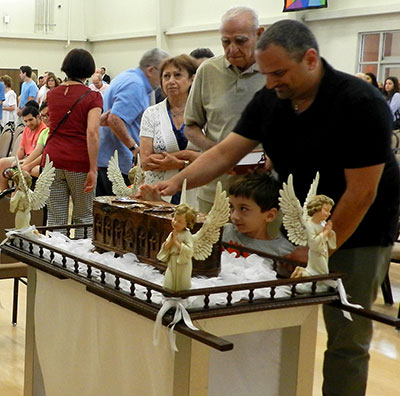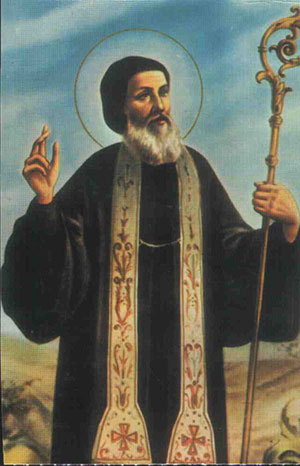 WASHINGTON, D.C. — Many people looking at their February calendars are doing a double-take with Ash Wednesday falling on Feb. 14, Valentine's Day.
WASHINGTON, D.C. — Many people looking at their February calendars are doing a double-take with Ash Wednesday falling on Feb. 14, Valentine's Day.
The two days, steeped in tradition, don't have too much in common beyond their religious roots. Valentine's Day, named after St. Valentine, a third-century martyr, is all about romance with its emphasis on cards, candy, flowers and nice dinners, where Ash Wednesday takes a more somber tone as the start of 40 days of prayer, fasting and almsgiving of Lent.
Ash Wednesday also is one of two days, along with Good Friday, that are obligatory days of fasting and abstinence for Catholic adults -- meaning no eating meat and eating only one full meal and two smaller meals. In other words, not a day for consuming candy hearts, chocolate cakes or fancy steak dinners.
And for those who wonder if Catholic bishops might grant a dispensation from the day's fasting requirements, as they sometimes have with the no meat rule when St. Patrick's Day falls on a Friday in Lent, they should probably think again.
Bishop Peter Jugis is not issuing a dispensation from the Ash Wednesday fast due to the Valentine’s Day holiday. He suggested that people celebrate Valentine’s Day the day before (Feb. 13 – Mardi Gras), or enjoy a nice fish dinner together on Valentine’s Day.
Researchers at the Center for Applied Research in the Apostolate, or CARA, based at Georgetown University, point out that the two days will overlap again in 2029 and that in 2096, Ash Wednesday will occur on Leap Day – Feb.29 for the first time in the Church's history.
Despite the rarity of this year's Ash Wednesday date, an article on the CARA website notes that it is unlikely the U.S. bishops would give an Ash Wednesday dispensation as some of them have on St. Patrick's Day mainly because not much is known about St. Valentine. It points out that he is said to have been killed at the command of Emperor Claudius in the year 278 for marrying Christians at a time when the emperor was trying to recruit single men for the army.
Not only are there few details of the saint, there are also mixed accounts of possibly three different martyrs named Valentine that share a Feb. 14 feast day. The confusion and lack of details led the church to remove the liturgical feast of St. Valentine from the general church calendar in the late 1960s.
Instead, Sts. Cyril and Methodius, brothers known as the "Apostles of the Slavs" for their work in spreading the Gospel throughout Eastern Europe in the ninth century, have the Feb. 14 feast day spot on the church calendar, although this year their day is superseded by Ash Wednesday.
These brothers – who developed an alphabet and translated the bible and other works in a Slavic language – have just as much to say about love on a day when that is celebrated because of their emphasis on communication, which is so key to relationships, said Father Leo Patalinghug, who has a cooking show on the Eternal Word Television Network called "Savoring our Faith."
The priest, who knows a thing or two about making a good Lenten meal, and also writes and talks about couples keeping their relationships strong by celebrating with good meals once a month, sees no conflict in the Ash Wednesday, Valentine's Day overlap. Instead, he views it as a great teaching moment.
"Love is not just sweets and chocolates," said the priest who wrote the 2012 cookbook: "Spicing Up Married Life" which includes recipes, prayers and conversation topics. "You can have chocolate cake anytime," he added.
As he sees it, the bigger lesson is to think about "going without and where that will lead you."
"So often people treat love like fast food when love – and all things of God – take time," he added.
He said this Valentine's Day couples have the "perfect day to start Lent and to have that discussion of what love means." And, they can also have a modest meal that is delicious.
Overall, it's "absolutely a win-win," he noted because couples can have a "Lent appropriate menu" essentially infused with the day's reminder "to know humbly we are from dust."
— Carol Zimmermann, Catholic News Service
 CHARLOTTE — The Diocese of Charlotte is home to a small Maronite Catholic community – St. Stephen Maronite Catholic Mission – that offers weekly liturgies in English and Aramaic at St. Matthew Church in south Charlotte.
CHARLOTTE — The Diocese of Charlotte is home to a small Maronite Catholic community – St. Stephen Maronite Catholic Mission – that offers weekly liturgies in English and Aramaic at St. Matthew Church in south Charlotte.
St. Stephen’s parishioners, some 40 families, are meeting at St. Matthew’s main church ever since last October, when because of COVID-19 pandemic restrictions they were unable to use their regular meeting place at St. Matthew’s Waxhaw location.
Father Rodolph Wakim has served as the mission’s pastor since last October, after moving down from Pittsburgh, where he served for 13 years as pastor of Our Lady of Victory Maronite Catholic Church.
He has a devotion to Adoration of the Blessed Sacrament and says he is grateful to Bishop Peter Jugis for providing him with a home featuring a small chapel in a converted garage. He offers daily Mass from the chapel, sharing the liturgy on Facebook for his flock.
“On Thursday, after daily Mass, I have Eucharistic Adoration in the chapel, which is a blessing,” Father Wakim says.
He travels from his home near St. Gabriel Church in Charlotte to St. Matthew’s main church on Saturday evenings to offer Mass at 7 p.m. All Catholics of any rite are welcome to attend the Mass, which is said in English and Aramaic.
The Charlotte mission is part of the Eparchy of St. Maron of Brooklyn, N.Y., which encompasses 16 states including North Carolina.
— SueAnn Howell, senior reporter.
Pictured: Hundreds of people turned out to venerate a relic of St. Sharbel, a 19th century Lebanese monk, at St. Stephen Maronite Mission in 2016. Along with St. Maron, St. Sharbel is one of the most celebrated saints in the Maronite Church. (File | Catholic News Herald)
Learn more
At www.ststephenclt.org: Learn more about St. Stephen Maronite Catholic Mission of Charlotte
At www.facebook.com/StStephenNc: Follow the mission on Facebook to watch daily Mass and keep up with parish news
Questions? Contact Father Wakim at 704-412-1016 or email This email address is being protected from spambots. You need JavaScript enabled to view it.
Who are the Maronite Catholics?
 The Maronite Catholic Church, one of 23 rites in the universal Church, was founded by disciples of St. Maron, an ascetic hermit who lived between the fourth and the fifth centuries A.D. near Antioch.
The Maronite Catholic Church, one of 23 rites in the universal Church, was founded by disciples of St. Maron, an ascetic hermit who lived between the fourth and the fifth centuries A.D. near Antioch.
It was in Antioch that the followers of Jesus were first called “Christians” (Acts 11:26). St. Peter fled to Antioch when a persecution broke out in Jerusalem, and according to tradition, St. Peter founded the Church at Antioch and became its first bishop.
St. Maron was a contemporary and friend of St. John Chrysostom, a Father and Doctor of the Church. Leaving Antioch to live as a hermit, he attracted many followers because of his holiness. After he died in 410 A.D., his disciples built a monastery in his memory, and his feast day is celebrated on Feb. 9.
Maronites soon came under threat from the rise of Islam and the power of the Byzantine Empire throughout the region now known as Lebanon and Syria. Amid the political, social and religious chaos, the Maronites elected their first patriarch, St. John Maron, in 687 A.D., setting themselves up as a distinct rite within the Church that recognized the authority of the pope.
When Muslim invaders stormed through, they fled to safety in the mountains of Lebanon. There they remained – at first living and worshiping in caves and grottos and later in small churches and monasteries – cut off from the rest of the Christian world for about 400 years.
During the Crusades, Christians from the West reconnected with the Maronites. Rome, previously unaware that the Maronites still existed, reached out to help them, and in turn the Maronites provided aid to the crusaders.
After the Ottoman Empire rose from the remnants of the Byzantine Empire in the mid-1400s, its Muslim rulers set up an alliance with the Maronites to govern together in Lebanon – forming the basis of the modern Lebanese republic, in which Christians and Muslims share the top positions in government.
Maronite Catholics profess the same apostolic faith and celebrate the same sacraments as Roman Catholics, but retain a distinct liturgy, hierarchy and code of canon law.
In the Maronite Church, the celebration of the Eucharist is also called Qurbono (Syriac), Quddas (Arabic) and Divine Liturgy.
The liturgical language is Syriac, a dialect of Aramaic – the language of Jesus. Aramaic is still used in the Divine Liturgy, notably during the Consecration.
Many of the prayers are also derived from the Liturgy of St. James and the writings of ancient Eastern Fathers, especially St. Ephrem, a Doctor of the Church.
The Maronite Catholic Church is led worldwide by Patriarch Bechara Boutros al-Rahi. The See is in Bkerke, Lebanon.
The Maronite population is estimated at more than 3.5 million, including more than 1 million in Lebanon and more than 79,000 in the United States.
— Sources: Wikipedia, www.stmaron.org, www.bkerki.org
The Eucharistic Prayer in Aramaic
Listen to the Consecration chanted in ancient Aramaic during a Maronite Catholic Mass:

